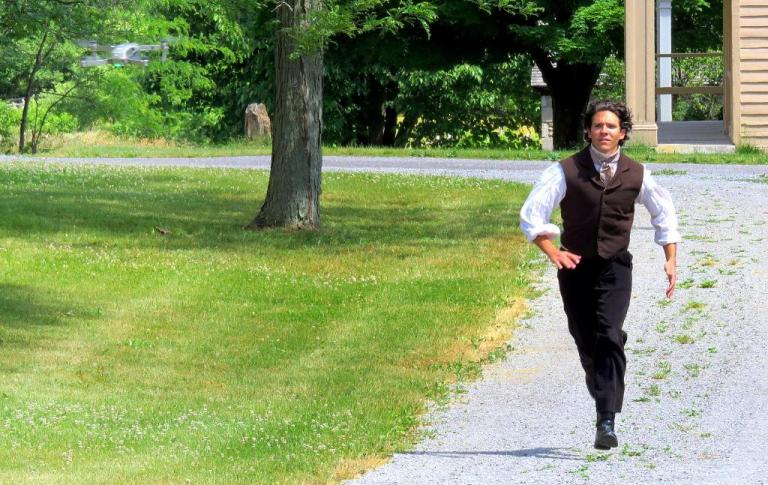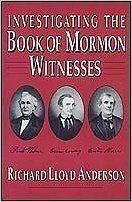
Roughly a year before his death, we recorded a two-day interview with Richard Lloyd Anderson (9 May 1926 – 12 August 2018). Armed with a law degree from Harvard and a doctorate in ancient history from the University of California at Berkeley, Richard was a meticulous scholar who devoted a large portion of his life to the careful study and evaluation of the Witnesses to the Book of Mormon. (I consider his Investigating the Book of Mormon Witnesses one of the great pioneering books of Latter-day Saint scholarship and the essential starting point for any serious study of the subject identified in its title.). He was also one of the kindest, humblest, and most genuine men I’ve ever known.

He wrote other excellent things on the Witnesses, as well — to say nothing of other topics — since this book, but “Investigating the Book of Mormon Witnesses” remains the indispensable starting point on the subject.
To my absolutely delight, the preparation for that extended interview provided the inspiration and impetus for what would eventually become the Interpreter Foundation’s much more comprehensive overall Witnesses film project, which is now quite far along.
A couple of days ago, I had occasion to recall the following portion of that interview, and I share it with you now.
Richard Lloyd Anderson Day 1 Transcript, Unpublished Interview
Interviewed by Daniel Peterson
So as you look at the testimony of the Book of Mormon Witnesses, I think their weakness is, in a sense a paradox, proved their strength.
You’ve got Oliver Cowdery, who is trained in education equivalently to today. And he’s a white-collar man and he’s a thinker and analyzer. Now, if you wanted to get the best three representatives of the human race, you certainly include him. But he’s in the minority, even today, as of an educated people.
David Whitmer is a tradesman; he’s a businessman. I go up and down the elevators at Brigham Young University and I’ll always do a short interview with an unknown student that I’m riding with. And I’m impressed that most students at BYU don’t come to tinker with their thinking. They just want to get a job. Which (laughs) is humorous to me because that’s the last thing I worried about in my education. And my bank account shows it. But the point is that that represents a big slice of educated people: the ones that are pragmatically educated. And David Whitmer represents that. He ran a business for fifty years and kept his profits in the black instead of in the red.
And then there’s Martin Harris, and he’s the religious fanatic — using the terminology of some people who knew him. They have a hard time with Martin Harris because he is a believer. And sometimes he believes in too much — maybe things that we wouldn’t now. But I’m struggling because I’m a deep believer, but I’m a skeptic too. And so it’s a very difficult thing for me to just listen to somebody over the radio late at night, when I’m brushing my teeth before I go to bed and I hear how great a certain pill is and how cheap it is. And the patent medicine sales pitch is alive and well and it is because people believe it.
So you’ve got somebody who’s what you would call an intellectual, somebody who’s a pragmatic businessman, and somebody that is a true believer. And Martin Harris gets criticized for being a true believer, but that’s part of the logic of having three witnesses who were representative of the human race.
Each one of these men made a contribution to the Book of Mormon. Oliver Cowdery is called, by Cleon Skou — excuse me for using the wrong first word because I knew Cleon Skousen who is the uncle of Royal Skousen and they were at opposite ends of the intellectual spectrum. I respect them both because they’re both hard workers, but Royal Skousen has spent more hours reading the Book of Mormon than anybody that I have ever heard about, or know, or could even conceive. He’s lived with that for fifty years, that I’ve known him, and he works with the technical text of the Book of Mormon.
And he says, of Oliver Cowdery, that he’s the best of all of the transcribers of the Book of Mormon. He spells better. He doesn’t punctuate, but he’s got most of his words straight except — and then there’s a list of twenty-five words that Oliver Cowdery misspells. And if you looked at the spelling of other educated people at that day, they’re common words that sound like the word that Oliver wrote down. So what I’m saying is that Oliver Cowdery was the best that Joseph Smith could get to be a transcriber — a scribe.
Martin Harris was the best that Joseph Smith could get to be a financier. Everybody, in Palmyra, who wrote about this, was shocked to think that he would devote his money to such a worthless thing as a new scripture and Book of Mormon — a cheap imitation of the Bible. And then David Whitmer was the best businessman that Joseph Smith could get. So I’ve reiterated that the contributions of these people in the production of the Book of Mormon, which was the reflection of their lives. The Book of Mormon itself was miraculous to the people that brought it forth especially.
And it was fitting that they could see the plates because they came to Joseph Smith and said, “The last revelation you received, that we’ve read, says that the people who brought the Book of Mormon forth can see the plates. We’ve all helped to bring it forth. Are we the ones?” and Joseph Smith said, “Yes.”
So the very selection of these men as witnesses, to me, is faith promoting as a historian.












